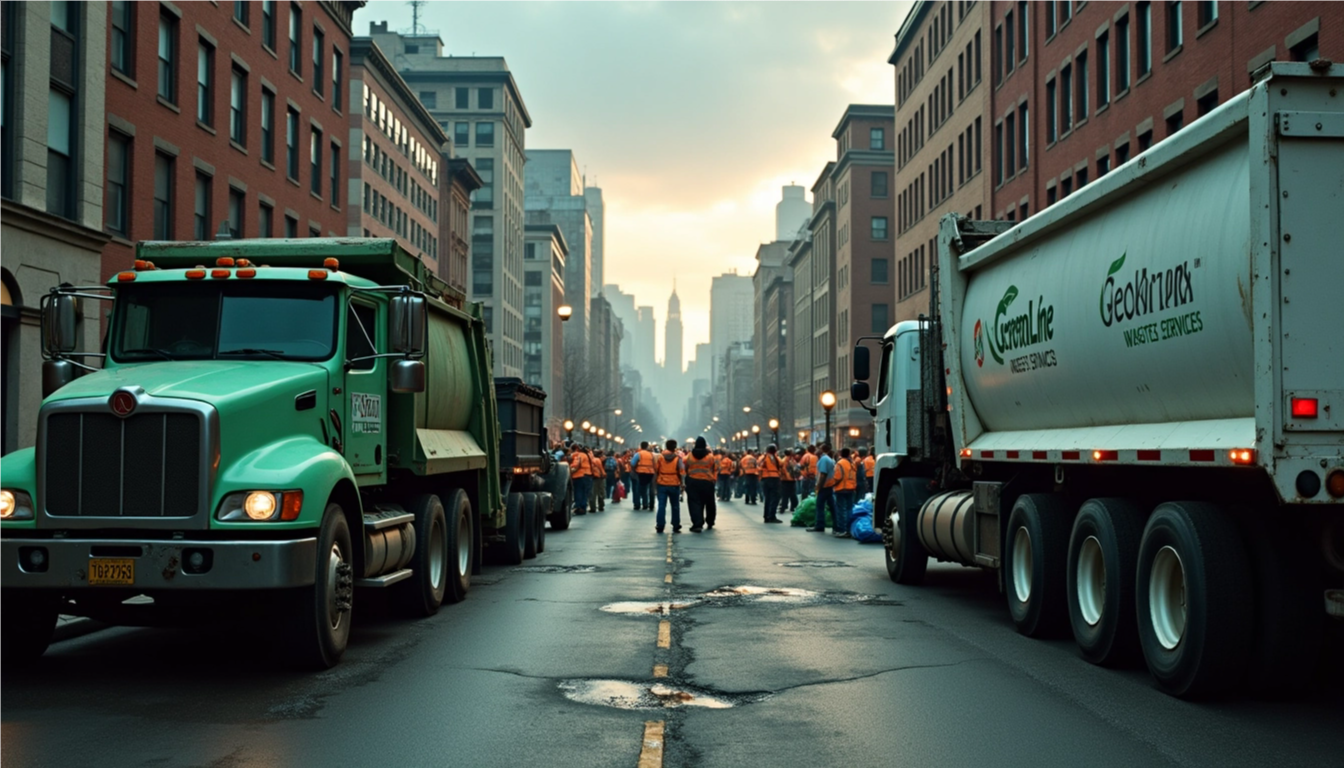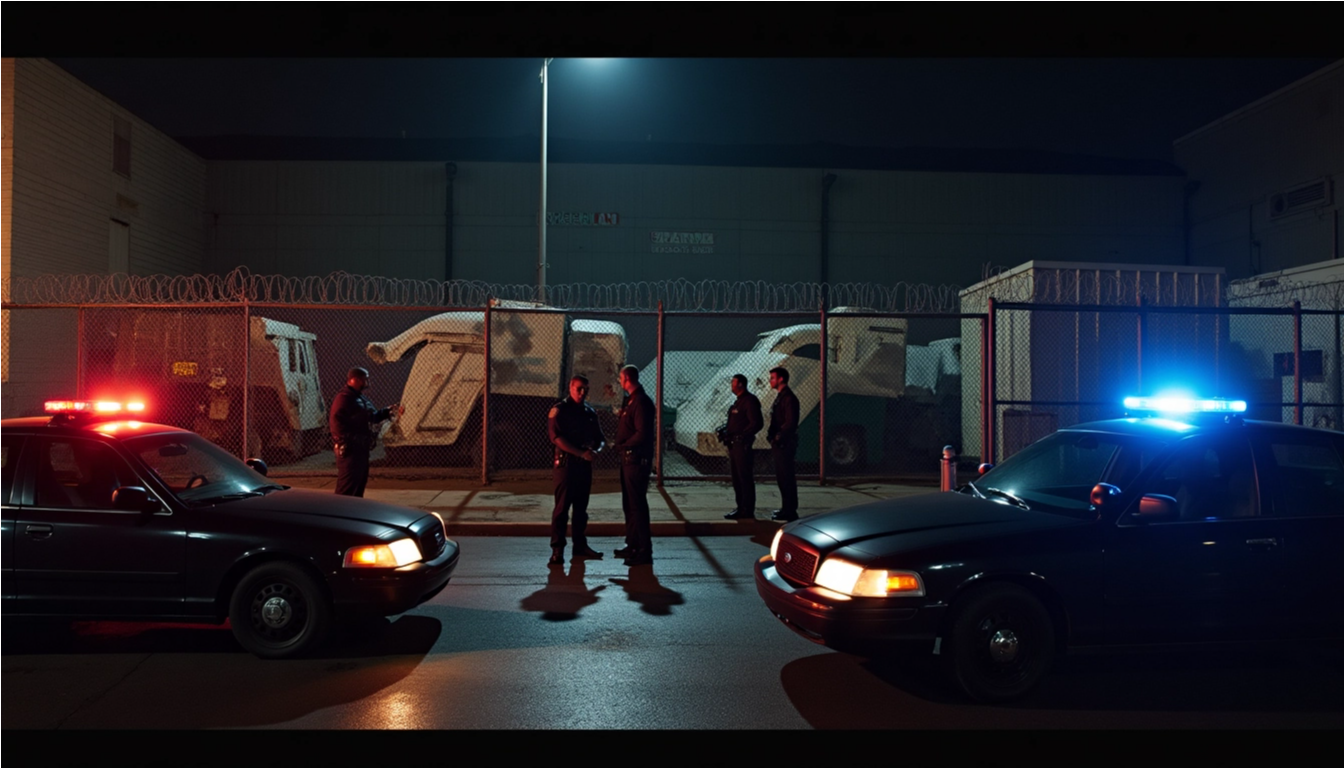The Waste Wars: A New Challenger on the Streets
How a newcomer's clean business model is threatening to upend decades of mob-controlled garbage collection.
The Waste Wars – A Three-Part Series
Part 1: A New Challenger on the Streets
South Philly’s garbage game has always been PhilWaste’s territory — rough trucks, rougher men, and a silent understanding that the streets stay theirs. But a shiny new competitor, GreenLine Waste Services, just rolled into town with polished rigs and promises of cleaner, cheaper pickups. To the city, it looks like healthy competition. To the Marcuccios, it’s a threat to decades of control. Behind the trash routes and union chatter, tensions are rising… and not everyone’s walking away from these “business talks” unscathed.
Philadelphia’s streets are quieter at dawn. Delivery trucks make their first rounds, SEPTA buses idle at their start points, and storefronts roll up their steel grates. It’s also the hour when the city’s garbage trucks do their most important work—before the morning rush clogs the narrow arteries that pass for streets in our older neighborhoods.
For decades, those trucks have carried a single name on their side: PhilWaste Services. The white-and-green logo, faded on some rigs, fresh on others, has been as much a part of the city’s landscape as SEPTA tokens once were. They’ve hauled for every kind of customer—small restaurants in South Philly, skyscraper office towers in Center City, the stadium complexes down by Pattison.
And they’ve done so with remarkable consistency. Not in service, necessarily—that depends on who you ask—but in winning city contracts.
“PhilWaste has been here forever,” said one City Hall source I’ve known for years, speaking on condition of anonymity. “They bid on everything, and they get it. Sometimes they’re the only ones who even submit a bid. That’s how it’s been for twenty-five years.”
In a city with this much history, change tends to come slowly. But in the last twelve months, something unusual has been happening in Philadelphia’s waste industry.
Enter GreenLine Waste Services
If you’re a commercial property manager or run a small business, you may have already received their flyer in the mail—bright blue logo, photos of shiny new trucks, a promise of “Clean Service. Clean Practices.” GreenLine Waste Services is a newcomer, incorporated less than two years ago in New Jersey but already making waves on our side of the bridge.
Their pitch is straightforward: lower rates, transparent billing, guaranteed pickups, and a customer service hotline that—unlike some of PhilWaste’s lines—doesn’t loop you in a 45-minute hold pattern.
I spoke to Darryl Price, owner of a family-run grocery in East Passyunk, who recently switched from PhilWaste to GreenLine.
“They showed me their price sheet, and I thought it was a scam,” Price said. “Fifteen percent cheaper, no fuel surcharge, no ‘container rental’ fee. With PhilWaste, my bill was like reading hieroglyphics. Every month, something new added on. GreenLine’s been here two months—never missed a pickup. Guys even put the lids back on my bins. You ever see that before?”
Several other business owners echoed the same story: consistent service, no surprise charges, lower cost.
But the bigger question is how GreenLine is winning these contracts so quickly in a market that’s been effectively closed to newcomers for a generation.
Breaking the Monopoly
Philadelphia’s waste industry has always been about more than garbage. At its core, it’s about routes—and routes are about relationships.
“You don’t just roll into Philly with a truck and start picking up trash,” said Mike Hanley, a retired sanitation supervisor who now consults for commercial haulers in the Midwest. “Routes are guarded like family secrets. You get in by buying someone out, or you get in because somebody with clout opens the door for you.”
GreenLine hasn’t bought anyone out. Their trucks are brand new, their uniforms sharp, their operation run from a gleaming South Jersey office park. Public records show they’ve landed major contracts with a half-dozen Center City office buildings, a chain of grocery stores, and several well-known restaurant groups.
They’ve also picked up something else: attention from the wrong kind of people.
PhilWaste: The Old Guard
When I ask around about PhilWaste, the first thing I hear is how deep their roots go. Officially, they’re a “family-owned business” founded in 1978. Unofficially… well, in Philadelphia, “family” can mean a lot of things.
Over the years, there have been whispers—never proven—about connections between PhilWaste executives and certain South Philadelphia figures known for interests in construction, shipping, and other cash-heavy industries. In organized crime terms, garbage is perfect: steady money, easy to skim, and essential to every business in the city.
Nobody I spoke to would go on the record linking PhilWaste to the Marcuccio crime family. But several sources in law enforcement and city politics gave me variations of the same answer: a long pause, a glance over the shoulder, and “It’s been that way as long as I can remember.”
One former city contract officer told me, “PhilWaste doesn’t lose. That’s all I’m saying.”
Why This Matters Now
GreenLine’s entry into the market isn’t just a business story—it’s a political one. Every contract they win is one PhilWaste loses. And with each lost route, the balance of influence in this city shifts.
City Council members are already feeling pressure. I spoke to Councilman Reed, who chairs the Public Works Committee. He wouldn’t comment directly on PhilWaste’s practices but admitted he’s been getting calls.
“Any time there’s a disruption in a service industry like waste hauling, it hits a nerve,” Reed said. “These aren’t just companies—they’re employers, they’re donors, they’re fixtures in their communities. Change is complicated.”
Change is also risky. Rumors are circulating about union concerns, particularly in the sanitation workers’ local. While GreenLine’s workforce is non-union, PhilWaste crews are unionized—and fiercely protective of their jobs and territory.
“If they think their routes are threatened, you’re going to see pushback,” said Hanley, the former supervisor. “That’s just the reality. And pushback can mean anything from paperwork delays to… other forms of persuasion.”
Small Signs of Trouble
In the past month, there have been small but telling incidents.
• A GreenLine truck’s tires were slashed overnight in a secured Center City garage. No arrests were made.
• A restaurant that switched to GreenLine found its bins mysteriously filled with concrete chunks the next morning. The extra weight caused the pickup to be skipped; the owner had to pay for removal.
• One office building manager told me their PhilWaste rep showed up unannounced after they’d canceled service—smiling, shaking hands, and casually mentioning the “security risks” of working with an “out-of-town” company.
Individually, these are minor events. Together, they suggest the first ripples of a coming storm.
Looking Ahead
If history is any guide, this won’t stay a quiet competition for long. Waste management contracts are lucrative, and the people who hold them don’t give them up easily.
GreenLine appears committed to expanding. Their public relations team sent me a statement emphasizing their “commitment to transparency, sustainability, and customer satisfaction.” They didn’t comment on the incidents I described, but they did confirm plans to bid on additional city contracts this fall.
PhilWaste, for their part, declined to respond to multiple requests for comment.
The tension is there, just under the surface. You can feel it in the careful words of politicians, in the guarded tone of business owners, in the sidelong glances of people who’ve been around this city long enough to know what happens when money and muscle collide.
And in Philadelphia, they always collide.
This is the beginning of a story with more moving parts than most people realize. It’s about garbage, sure—but it’s also about power, leverage, and the invisible hands that steer city policy from the shadows.
The trucks may look the same from the outside. But whose logo they carry in the months ahead will tell you a lot about where Philadelphia is heading—and who’s really in charge.
Stay vigilant,
Will Ryland





